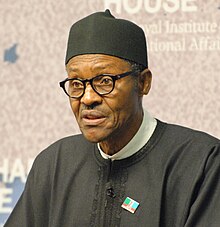
Back Muhammadu Buhari Afrikaans Muhammadu Buhari AMI محمد بخاري Arabic محمد بخارى ARZ Muhammadu Buhari AST Məhəmmədu Buhari Azerbaijani Махамаду Бухары Byelorussian Мухамаду Бухари Bulgarian মুহাম্মাদ বুহারি Bengali/Bangla Muhammadu Buhari Breton
Muhammadu Buhari | |
|---|---|
 | |
| President of Nigeria | |
| In office 29 May 2015 – 29 May 2023 | |
| Vice President | Yemi Osinbajo |
| Preceded by | Goodluck Jonathan |
| Succeeded by | Bola Tinubu |
| 7th Head of State of Nigeria | |
| In office 31 December 1983 – 27 August 1985 | |
| Preceded by | Shehu Shagari |
| Succeeded by | Ibrahim Babangida |
| Governor of the Northeastern State | |
| In office August 1975 – March 1976 | |
| Preceded by | Musa Usman |
| Succeeded by | Position abolished |
| Personal details | |
| Born | 17 December 1942 Daura, British Nigeria[1][2] |
| Nationality | Nigerian |
| Political party | All Progressives Congress |
| Spouse(s) |
|
| Children | 10
|
| Alma mater | |
| Website | thisisbuhari |
| Military service | |
| Allegiance | |
| Branch/service | Nigerian Army |
| Years of service | 1961–1985 |
| Rank | Major General |
Muhammadu Buhari, GCFR (born 17 December 1942) was the President of Nigeria and a former Major General in the Nigerian Army. He first became Head of State of Nigeria on 31 December 1983 when he took over the government by surprise.[4][5] While he was in power, he passed laws to control how people behaved that were very harsh[6] and put many people in jail, even the famous musician Fela Kuti.[7] On 27 August 1985, there was another surprise takeover and he was no longer in charge of the country.
In the 21st century, Buhari decided to try and become head of state again and ran in multiple elections. He eventually won and became President of Nigeria in 2015. He brought back some of the harsh laws from the last time he was in charge of Nigeria.[8] Now, more people have been criticizing him as part of the End SARS protests.
- ↑ "Muhammadu Buhari Presidential Candidate". thisisbuhari.com. Archived from the original on 2018-10-15. Retrieved 2015-02-08.
- ↑ "Muhammad Buhari". Enyclopaedia Britannica. Retrieved 2015-02-08.
- ↑ "Famous U.S. Army War College Alumni". Ranker.com. Retrieved 1 April 2015.
- ↑ "Military Regime of Buhari and Idiagbon". Retrieved 12 September 2013.
- ↑ Max Siollun (October 2003). "Buhari and Idiagbon: A Missed Opportunity for Nigeria". Retrieved 12 September 2013.
- ↑ May, Clifford D. (1984-08-10). "NIGERIA'S DISCIPLINE CAMPAIGN: NOT SPARING THE ROD (Published 1984)". The New York Times. ISSN 0362-4331. Retrieved 2020-10-25.
- ↑ Moyer, Justin Wm. "Muhammadu Buhari vs. Fela Kuti: Nigeria's new president-elect once jailed a music icon". Washington Post. ISSN 0190-8286. Retrieved 2020-10-25.
- ↑ "Nigeria relaunches controversial 'war on indiscipline' brigade". the Guardian. 2016-08-17. Retrieved 2020-10-25.